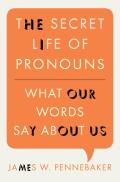The Politics of Pronouns
Last month I quoted from an interview with James W. Pennebaker, a University of Texas psychologist who has researched our use of pronouns and how they correlate with other traits.
It turns out (not entirely as a surprise) that Pennebaker has a new book coming out, titled The Secret Life of Pronouns: What Our Words Say About Us.
Ben Zimmer’s review for the New York Times begins:
It turns out (not entirely as a surprise) that Pennebaker has a new book coming out, titled The Secret Life of Pronouns: What Our Words Say About Us.
Ben Zimmer’s review for the New York Times begins:
When President Obama addressed the nation after the killing of Osama bin Laden in May, some conservative reactions to his rhetoric were all too predictable. On National Review Online, Victor Davis Hanson highlighted the 15 times that Obama used “I,” “me” or “my” in the 1,400-word speech, and asserted that “these first-person pronouns . . . reflect a now well-known Obama trait of personalizing the presidency.” A few weeks later, when Obama gave a speech at the C.I.A.’s headquarters in Langley, Va., the Drudge Report offered the headline, “I ME MINE: Obama praises C.I.A. for bin Laden raid — while saying ‘I’ 35 times.”Especially if one’s standards for what seems arrogant in a black man’s speech are different from what seems arrogant in a white man’s speech.
This “well-known Obama trait” has come up again and again in criticisms from the right — George Will has said that Obama is “inordinately fond of the first-person singular pronoun,” while Charles Krauthammer has written of the president’s “spectacularly promiscuous use of the word ‘I.’ ”
Regrettably, none of these pundits have bothered to look into how Obama might compare with his predecessors. . . . Pennebaker crunches the numbers on presidential press conferences since Truman and finds that “Obama has distinguished himself as the lowest I-word user of any of the modern presidents.” If anything, Obama has shown a disdain for the first-person singular during his administration.
“Why,” Pennebaker wonders, “do very smart people think just the opposite?” He chalks it up the selective way we process information: “If we think that someone is arrogant, our brains will be searching for evidence to confirm our beliefs.” If we’re predisposed to look for clues that Obama is all about “me me me,” then every “me” he utters takes on outsize importance in our impressionistic view of his speechifying.



1 comment:
standards? we don't need no freakin' standards!
Post a Comment